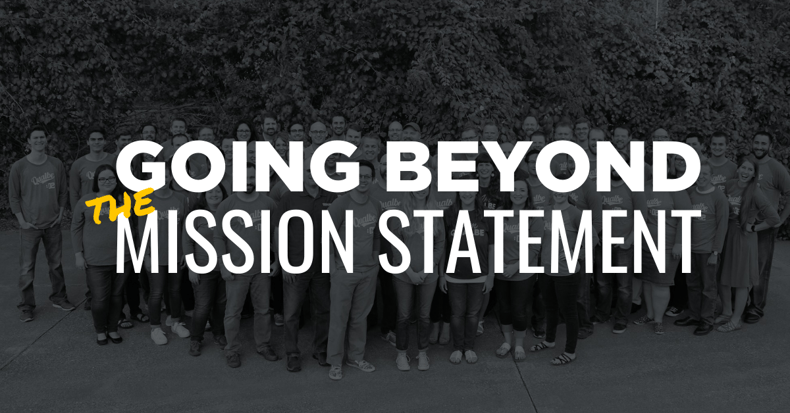
Words are cheap. What I mean is that it’s easy to say something, but it’s a heck of a lot harder to actually put those words into action. For example, I’ve been thinking a lot recently about how it’s become commonplace for companies to trumpet their mission, vision, and values. Everyone says they have a higher purpose with their business, something more than just pursuing profit, which is great. The idea is to show your associates, your customers, and the communities you operate in that you have a higher purpose than just making money at their expense.
But the disconnect for me is that when something goes wrong—like the Black Swan of a pandemic hitting—all these words get tossed in the garbage.
<<Jack wants to know your thoughts! Leave a comment at the bottom of this page, and Jack Stack and Darren Dahl will comment back and/or answer any questions you might have. >>
Worth less than the paper they’re printed on
I keep coming back to a conference I attended the summer before Covid hit. It was filled by a who’s who list of corporate executives from many of the biggest and well-known companies around. Those leaders had gathered to talk about the newest trends in business management theory. Honestly, as I looked around, I wondered what I was doing there. When I got my chance to speak, I shared how at our company we had been forecasting that an economic downturn was on the way. I also spoke about how we used that insight to build a safety net, a war chest of cash, to help ensure we could weather the upcoming storm and preserve the jobs of our associates.
What I’ll never forget is how an executive from one of the world’s best-known tech companies stood up after I was finished and admitted that if a downturn hit, they would fall back on the same management practices that had been used since the 1900s. Her company, unlike ours, would simply lay a bunch of people off like they had always done.
And you know what, she was right. Her company, just like many other big companies in the wake of the pandemic, laid off thousands of people. What really bugs me is that many of these were the same companies who, as part of a Business Roundtable announcement in 2019, got a lot of publicity by saying they were now “purpose-driven” and committed to their shareholders—which included their employees.

But a new study by an organization called the Test of Corporate Purpose found that many of the 181 companies that signed the statement from the Business Roundtable have failed to live up to their mission and purpose when things went south with the pandemic. I find that depressing.
You can’t pursue a mission without money
Companies that lay people off always use the same excuse: they’ve run out of money, so they had to cut people. They had no choice. But why doesn’t anyone in these companies think about contingencies and trap doors they can use to stay true to their purpose even when something goes wrong? Don’t they recognize that without money, there’s no mission?
There is no doubt that if an organization wants to last—if it wants to stay in business 100 years or more—it needs a purpose. But it also needs a healthy balance sheet.
It was always my fear that if we crafted a lofty sounding mission statement in our business, we could never live up to it. That’s why when we got our start, our mission was simple: don’t run out of cash and don’t destroy from within.
I’m reminded of walking into corporate buildings and seeing yellowing pieces of parchment hanging on the walls with a company’s mission statement printed on it. It’s something everyone in the company walks by on a daily basis—and completely forgets it’s even there. When I read these things, I also scratch my head and wonder: Can they really accomplish that?
I remember, for example, how Enron, one of the biggest cons of all time, listed, “Integrity: We work with customers and prospects openly, honestly and sincerely,” as one of its values.
It makes me wonder how many landfills are filled up with ignored and forgotten mission statements.
Living your values everyday
I think what’s so often missing in corporate cultures is a system that allows them to actually live and operationalize their purpose, vision, and values.  For us, that’s what The Great Game of Business brings us each and every day. It’s what ties all of our 1,800 associates in our SRC family of companies together and keeps us focused on our shared future. By working and planning together by playing the Great Game, we were fortunate to avoid layoffs during the pandemic and continue to push forward with our mission to create better lives for all of our associates.
For us, that’s what The Great Game of Business brings us each and every day. It’s what ties all of our 1,800 associates in our SRC family of companies together and keeps us focused on our shared future. By working and planning together by playing the Great Game, we were fortunate to avoid layoffs during the pandemic and continue to push forward with our mission to create better lives for all of our associates.
What’s so exciting to me is how the Great Game also helped so many other companies remain true to their own mission and values over the past year.

These folks are shining examples of what I see as the brighter side of capitalism or even capitalism at its best—a way for people to take control of their lives and truly fulfill their mission and purpose whatever that might be.
Let's have a conversation. Leave a comment at the bottom of this page, and Jack Stack and Darren Dahl will comment back and/or answer any questions you might have.
 is the Presenting Sponsor for The Great Game of Business Conference.
is the Presenting Sponsor for The Great Game of Business Conference.
.png)







.png)




-5.png)

